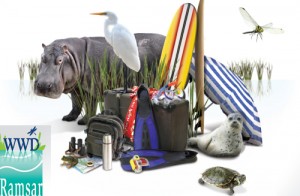World Wetlands Day 2012 Highlights Ecotourism as a Tool for Conservation

The 2nd of February each year is celebrated globally as the World Wetlands Day! It marks the date of the adoption of the Convention on Wetlands on 2nd February 1971, in the Iranian city of Ramsar on the shores of the Caspian Sea. Wetlands are areas where water is the primary factor controlling the environment and the associated plant and animal life. They occur where the water table is at or near the surface of the land, or where the land is covered by water. Because of the many cleansing benefits of wetlands, they are often called the kidneys of the ecosystem. This is an interesting metaphor since like kidneys, wetlands help control water flow and cleanse the system.The Ramsar Convention is the primary Convention working for the protection and conservation of wetlands and associated ecosystem services worldwide.
The Ramsar Convention takes a broad approach in defining the wetlands as, “areas of marsh, fen, peatland or water, whether natural or artificial, permanent or temporary, with water that is static or flowing, fresh, brackish or salt, including areas of marine water the depth of which at low tide does not exceed six metres”. Additionally, wetlands “may incorporate riparian and coastal zones adjacent to the wetlands, and islands or bodies of marine water deeper than six metres at low tide lying within the wetlands”.
This focus of the World Wetlands Day for the ongoing year 2012 is “Wetlands and Tourism”. This is linked to the theme for the next meeting of the Conference of the Parties, COP11: Wetlands, Tourism and Recreation, which will take place in July 2012, in Bucharest, Romania. Wetland tourism has benefits at all levels viz. local, regional and global. Wetlands themselves benefit people and wildlife leading to stronger economies, sustainable livelihoods, healthy people and thriving ecosystems. At least 35% of Ramsar Sites around the world record some level of tourism activity and this percentage is consistent throughout all regions. At the same time, almost all major wetlands of the world are consistent tourism sites. It should be noted here that ecotourism is only one of the services that wetlands deliver.
In addition to tourism, wetlands are closely linked to ecosystem functioning and well being of the society by providing the following broad ecosystem services:
- Flood control
- Groundwater replenishment
- Shoreline stabilization and storm protection
- Sediment and nutrient retention and export
- Water purification
- Reservoirs of biodiversity
- Wetland products
- Cultural values
- Climate change mitigation and adaptation
Ensuring well-managed tourism practices in and around wetlands and educating tourists on the value of wetlands can therefore go a long way in protecting and conserving our natural resources in a sustainable manner.
The city of Delhi has close to 700 wetlands and water bodies within its territorial boundary, and the number comes as a shock to many of its residents. The Delhi Climate Action Plan includes a list, total area and the present status of most of these wetlands. The pressure from a rural-urban demographic shift and increasing urbanisation is consuming several of these wetlands even before we can initiate measures for their protection. The infamous case of the Neela Hauz in South district of Delhi is a stark reminder of how the blame game of civic agencies can victimize our natural resources. It is for this reason that much more needs to be done today for raising awareness on the critical ecosystem services provided by wetlands especially amidst the rapid and often ad hoc urban development of the National Capital Region.
This World Wetlands Day, the least all of us can do is to identify and find out the wetlands in and around our place of residence, assess its ecological status and work for promoting its upkeep and conservation! Happy searching!
With inputs from Govind Singh




Thus, there is no problem at the installation and that saves
time and money as well. You can also strain water through a bandana or t-shirt to get the big stuff out.
Therefore everyone needs to be preparing to cope on their own for at least the first 72 hours.